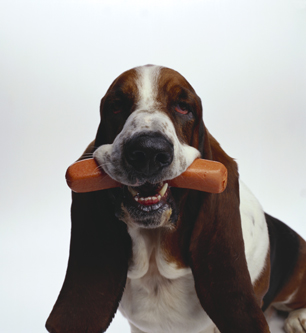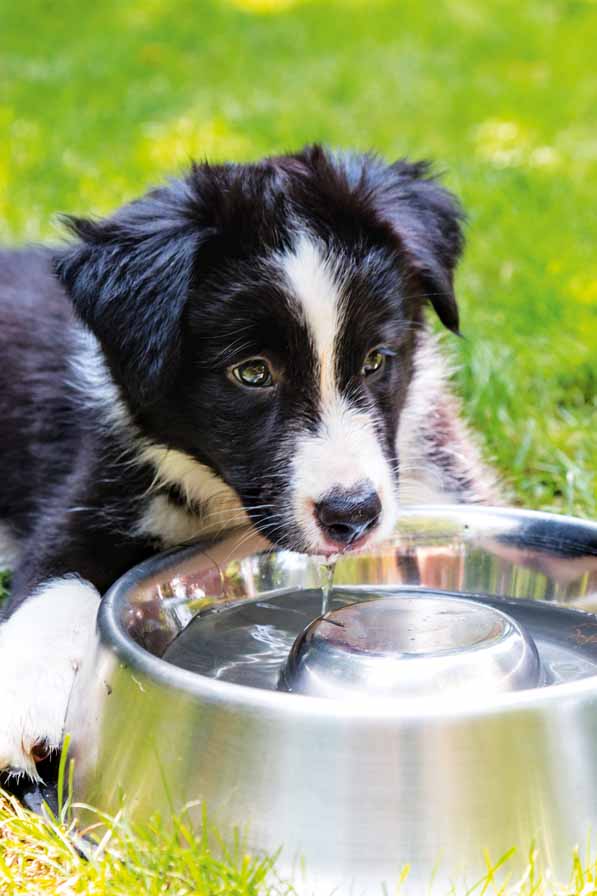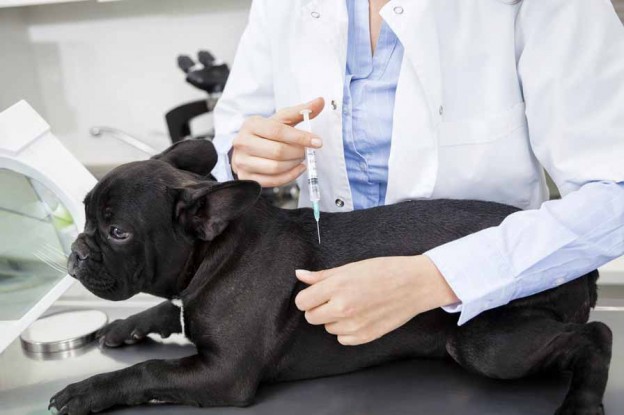
We all want the very best for our dogs and their health, but sometimes our best intentions with their diet requirements can go off track. Nadia Crighton discovers which vitamins and minerals for dogs are necessary.
With so much conflicting information available and so many products to choose from, its no wonder that many dog owners are confused about what their dogs actually need. This can lead to a variety of mineral and vitamin deficiencies that are detrimental to our dogs health and wellbeing.
To get a better understanding of our dogs needs, Dogs Life caught up with veterinarian Dr Barbara Fougere from the All Natural Vet Clinic in Sydney to ask about the growing number of doggy patients suffering from mineral and vitamin deficiencies.
Unless the food is already supplemented, some dogs can suffer from numerous deficiencies including zinc deficiency, magnesium deficiency or copper deficiency, Fougere said. So, if the quality of the food is poor, or the homemade diet is unbalanced, some mineral deficiencies can be observed.
Some classic symptoms of mineral and vitamin deficiencies in dogs are poor coat and skin, recurring infections, lack of energy and muscle cramps.
In breeding dogs, poor reproduction rate or poor fertility can be associated with mineral deficiencies, Fougere told Dogs Life.
Calcium deficiency
Probably one of the most dangerous deficiencies in dogs is that of calcium. As a building block for strong bones, calcium deficiencies, particularly in puppies, can spell a lifetime of pain and suffering from skeletal problems and bone malformation.
This is still seen particularly in those with dogs on unbalanced homemade diets, Fougere warned. You may also see this with dogs that only eat meat and are not being supplemented correctly. This can be quite profound in puppies that will have bone and joint malformations and fractures. It can be a little like osteoporosis in people, where there is a general weakening of the bone.
Problems can be difficult to spot, particularly in puppies, where their youthful enthusiasm can overshadow any problems. A slight case of dry skin can be easily misdiagnosed as allergies rather than a mineral/vitamin deficiency, particularly if the youthful dog is active and happy.
When animals are young their youth may overshadow any overt mineral deficiencies or excessiveness, she said. It is when the animal ages you will see the result of poor diets, particularly with coats and skin conditions. You may not see it in younger animals in comparison to older animals.
Minerals
Here are some of the main minerals found in dog food and the reasons why our dogs need them. Finding the right balance for your dog is critical in ensuring good health and wellbeing. Being deficient in any of these minerals can mean a variety of problems (including some possible behavioural ones).
Calcium: This is the most profuse mineral in the body. Needed for good bone and teeth formation. Aids the growth of the skeleton, regulates heartbeat and helps the nervous system and its functions. Also aids in brain functions and blood clotting. This is a balancing act as having too much calcium in the diet can cause just as many problems as having too little. Not having a balanced diet can also block or hamper the dogs ability to absorb calcium.
Phosphorus: Stimulates hair growth and helps with normal brain function. Helps maintain bone mass and keep tooth enamel strong. Also needs to be taken with the correct levels of various minerals. Many foods are high in phosphorus so if your dog is deficient in this mineral, chances are they are also deficient in many others.
Magnesium: Needed to transport and utilise important fats and other minerals and vitamins around the body. Also aids in strengthening bones and teeth and keeping tissues, muscles and red blood cells healthy. Magnesium deficiencies can also hamper the absorption of other important minerals.
Potassium: Helps with the functioning of the heart, eliminating waste from the body and the nervous system. This mineral is easily absorbed.
Sodium: Helps keep water levels in the body constant and the functioning of muscles.
Chlorine or Sodium Chloride: Helps replace minerals that are excreted during exercise. It is a cleanser found mainly inside the dogs cells.
Copper: Converts iron into haemoglobin and aids in pigmentation of the hair and skin. It also enhances energy levels.
Iodine: Necessary for the healthy function of the thyroid gland. It can also affect how certain vitamins are broken down in the body. Best form is found in kelp.
Sodium and Calcium Fluoride: Keeps teeth strong and healthy as to bones.
Sodium Selenite or Selenium: Helps elasticity in tissues and is also helpful with problems such as dandruff. Is also beneficial to the liver and muscles.
Sulphur: Helps with skin and coat health.
Zinc: Helps with correct growth and many internal systems. Needed for healthy hair, skin and nails. Also contains some antioxidant properties and supports the immune system and regulates white blood cells. Also helps detoxify the body. It can affect copper levels, which in turn can affect iron levels. It can also be blocked by too much calcium.
Diet
Ensuring your dog is getting the very best from his diet is a sure way to prevent deficiencies. A good quality pet food, alongside fresh meat and vegetables, can mean the best nutrition for your dog.
A lot of the prepared pet foods will be formulated with the absolute minimum amount of the required mineral, Fougere warned. But, that doesn’t necessarily mean that the minerals are all available to your dog, meaning that the minerals may not be absorbed and taken up into the body. This is because minerals come in many different forms in the way they are actually added to pet food.
This is because not all commercial foods are the same. Some are just formulated with the minimum recommended mineral levels without actually being tested for their mineral absorption rate.
You may believe that you are feeding your dog a complete balanced food but your dog could be suffering from some critical deficiencies, she said. You may not be aware of these deficiencies but when you start supplementing your dogs diet you’ll see a difference, for example, in their coat, colour and skin condition.
It is important to seek the right information when your dogs diet is concerned. Speaking with your veterinarian or a veterinarian nutritionist is a great way to start. If you are feeding your dog a homemade diet, perhaps speak with a holistic veterinarian as they commonly deal with problems arising on natural homemade diets without convincing you to unnecessarily change to a commercial diet.
Dogs need a good quality diet and you pay for what you get, essentially, Fougere said. If you are making up your own homemade diet, you really need to be getting some input from a veterinarian or a veterinarian nutritionist to make sure that your dog is getting exactly what they need.
Too much of a good thing
Dogs can sometimes get too much of the one mineral or vitamin that can also cause problems. Over supplementing your dog can not only be dangerous, it can also block your dogs ability to absorb other nutrients.
Some use mineral supplements excessively and giving one mineral in excess can actually block the absorption of another mineral, Fougere tells Dogs Life. For example, of you over supplement with calcium you may end up with a magnesium deficiency as the calcium will actually block magnesium and can also block zinc. So you might be supplementing and thinking you are doing the right thing, but could actually be blocking the absorption of other important minerals.
Adding too much liver can cause vitamin A excess in dogs. Canine health experts advise to only give your dog liver once a week. Some dog breeds are also more susceptible to certain ailments. For example, Dobermans and West Highland Terriers are known to suffer from copper excess and care must be taken when adding this to their diets.
My general advice is to buy good quality dry foods and supplement with fresh foods as well, like raw meat and fresh vegetables, to get the best possible results, Fougere said.
It is also extremely important to be aware of the dangers when supplementing your dogs diet. If you are concerned about any missing nutrient always speak with a professional and do not try supplementing with the theory well see how he goes.
When it comes to supplements, unless they are being prescribed by a veterinarian, you really need to be very careful with what you use, she said. A lot of the supplements you purchase in pet food shops are going to be quite low supplement levels, so you’ll usually be safe, but they wont necessarily treat a mineral or vitamin deficiency or make up for an unbalanced diet.
Never supplement your dog with human vitamins unless prescribed by your veterinarian. These contain much larger dosages and can cause problems with your pooch. There is a lot of information on the Internet. However, not all of it is good information so always speak to a professional before supplementing your dogs diet, she said.







